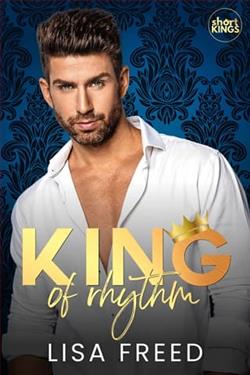Page 75 of Sunrise By the Sea
‘Sit down,’ she said. He had to clear a space piled high with pictures and books and music on the table and she wiped it down.
‘How did you move in with so much stuff?’ she asked, looking around.
‘I know,’ he said sadly. ‘I had to leave so much behind. No drums. No cello.’
‘ThankGod.’
‘Not for me,’ he said. ‘But I have friends . . .’
He sighed and looked sad suddenly.
‘I had friends.’
She placed the food in front of them and poured large glasses of the wine that, warmed and decanted, had grown full and sweet.
‘So how did you end up here?’ she said.
‘Is long and boring story,’ said Alexei dismissively.
‘Not to me,’ said Marisa. ‘Nobody ever tells me stories any more. Everyone’s forgotten about me, here at the end of the world.’
She didn’t mean to sound self-pitying, but somehow she did. He looked at her, those narrow brown eyes penetrating and clear. It was very odd: for someone who barely spoke the same language as her, she found him incredibly easy to read. She could see in those expressive eyes, with their long lashes, the exact way in which he turned over her question, looking for nuance, deciding within himself whether he was going to speak and how. He did it with everything. At first she had thought he was dopey or simply didn’t understand. Now she realised what a rare gift it was: to think before speaking.
‘Well,’ he said.
Chapter Forty-seven
It was so odd, thought Marisa, that they could be the same age – well, he was a few years older; thirty-four to her twenty-nine, and yet his life could be so different. He told her his father was Mongolian – ‘You know?’ – she absolutely did not know – but his mother’s family did not approve, and there was trouble from the start.
The marriage broke down, his father returned to Ulan Bator – that part of the story Marisa absolutely could empathise with – and his mother had had to move in with her own mother, in her horrible vast block, one of thousands, on the outskirts of the city, where it was always either boiling or freezing, where there was never enough hot water; where stray dogs roamed the buildings.
He had nothing but the old broken-down piano in his grandmother’s house; she had nothing, but sacrificed everything to keep that.
‘Oh, the neighbours hated me,’ he said quietly, and Marisa winced. She couldn’t bear to think of the little boy, confused and sad, only wanting his piano. How awful she must have been to him.
‘I’m sorry,’ she whispered, but he wasn’t really listening.
‘Oh but then . . . good thing happens! I get scholarship. To Germany!’
‘You speak German?’
‘Ja! Können wir Deutsch sprechen?’
‘No,’ said Marisa. ‘Italiano?’
He shook his head tightly.
‘And that was . . .’
‘That was amazing! The food, the supermarkets, the friends, the people . . . Oh, such wonderful country.’
He smiled happily.
‘This isn’t helping me understand where Cornwall comes in.’
‘So I play in Germany then I get work there as répétiteur. At the Munich Opera.’
He visibly swelled with pride.















